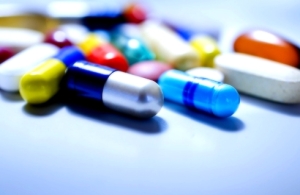It is known Avanafil is an oral drug that is used for treating impotence (the inability to attain or maintain a penile erection), also known as erectile dysfunction (ED). It is in a class of drugs called phosphodiesterase inhibitors that also includes tadalafil (Cialis), sildenafil and vardenafil (Levitra). Erection of the penis is caused by the filling of the penis with blood. Filling occurs because the blood vessels that bring blood to the penis increase in size and deliver more blood to the penis, and, at the same time, the blood vessels that take blood away from the penis decrease in size and remove less blood from the penis. Sexual stimulation that leads to an erection causes the production and release of nitric oxide in the penis. The nitric oxide causes an enzyme, guanylate cyclase, to produce cyclic guanosine monophosphate (cGMP). It is cGMP that is primarily responsible for increasing and decreasing the size of blood vessels carrying blood to and from the penis, respectively, and causing an erection. When the cGMP is destroyed by another enzyme, phosphodiesterase-5, the blood vessels return to their normal size, blood leaves the penis, and the erection ends. Avanafil prevents phosphodiesterase-5 from destroying cGMP so that cGMP stays around longer.
For most individuals, the recommended starting dose of avanafil is 100 mg per day taken about 30 minutes before sexual activity. Depending on the adequacy of the response or side effects, the dose may be increased to 200 mg or decreased to 50 mg a day. Individuals who are taking medications that moderately increase the blood levels of avanafil should not exceed a total dose of 50 mg in 24 hours.
Avanafil and alcohol both lower blood pressure. Therefore, combining avanafil with alcohol may cause excessive drops in blood pressure and cause dizziness, headaches, and increased heart rate.
For most individuals, the recommended starting dose of avanafil is 100 mg per day taken about 30 minutes before sexual activity. Depending on the adequacy of the response or side effects, the dose may be increased to 200 mg or decreased to 50 mg a day. Individuals who are taking medications that moderately increase the blood levels of avanafil should not exceed a total dose of 50 mg in 24 hours.
Avanafil and alcohol both lower blood pressure. Therefore, combining avanafil with alcohol may cause excessive drops in blood pressure and cause dizziness, headaches, and increased heart rate.

Dapoxetine is a selective serotonin reuptake inhibitor (SSRI) that was designed specifically for premature ejaculation. SSRIs have been shown to be effective for the treatment of PE. The downside to most SSRIs is that they must be taken daily in order to achieve the desired effect. Dapoxetine was designed to be taken on an “as needed” basis and has been shown to be effective when taken < 3 hours before sexual activity. Studies have shown that dapoxetine increases the intra-vaginal ejaculation latency time (IELT) – the time from vaginal penetration to male orgasm. For most patients, the starting dose is 60 mg. You may be prescribed Dapoxetine 30 mg or Dapoxetine 60 mg, while some patients may require Dapoxetine 120 mg if they did not respond to the original one.
Some medicines may interact with Dapoxetine. Tell your health care provider if you are taking any other medicines, especially any of the following:
• Alpha-blockers (eg, doxazosin), medicines for high blood pressure, nitrates (eg, isosorbide, nitroglycerin), or nitroprusside because severe low blood pressure with dizziness, lightheadedness, and fainting may occur
• Azole antifungals (eg, itraconazole, ketoconazole), H2 antagonists (eg, cimetidine), HIV protease inhibitors (eg, ritonavir, saquinavir), macrolide antibiotics (eg, erythromycin), narcotic analgesics (eg, dihydrocodeine), or telithromycin because they may increase the risk of Dapoxetine’s side effects
• Bosentan or rifampin because they may decrease Dapoxetine’s effectiveness.
No comments:
Post a Comment